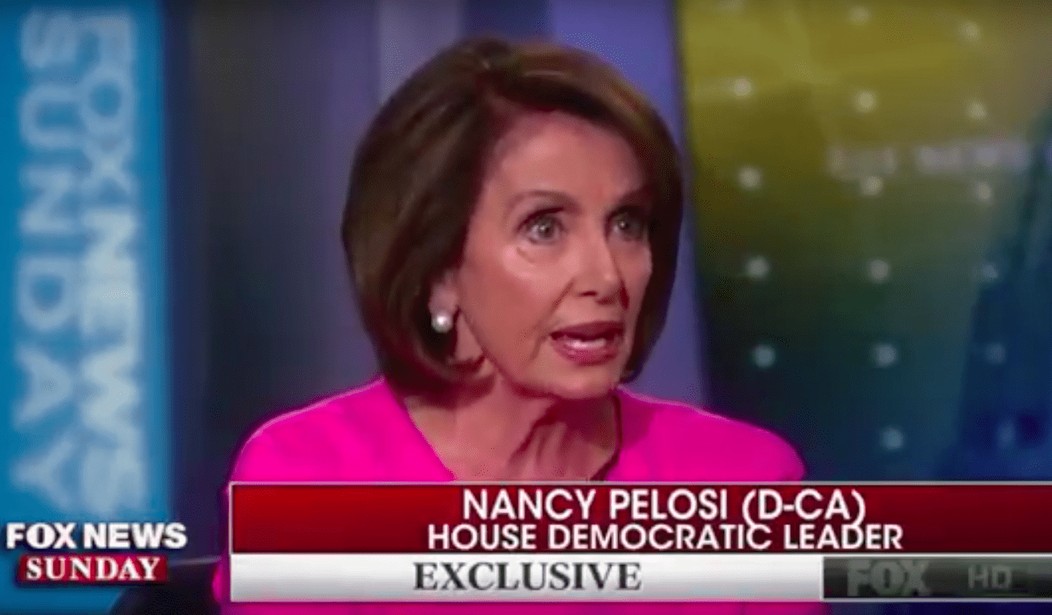On Sunday, House Minority Leader Nancy Pelosi (D-Calif.) said it was “unimportant” whether or not she would remain in the leadership of the Democratic Party in the future. The latest elections suggest otherwise.
When Fox News host Chris Wallace asked, “What are the chances Democrats win back the House [of Representatives], and if so, will you run for Speaker?” Pelosi dismissed the question, saying, “That’s so unimportant.”
Interestingly, this is one the few statements in American politics that can be empirically proven false. In June, the voters of Georgia’s 6th congressional district chose Republican Karen Handel to defeat Democrat Jon Ossoff in what was the most expensive congressional campaign in U.S. history.
Georgia 6 is a red district, but Democrats invested heavily to flip it, and it looked like they had an excellent chance to do so. But ads against Ossoff tied him to Nancy Pelosi, and it appears that message worked.
“Every morning I wake up and I take a moment to be thankful that the Republican Party still has Nancy Pelosi because Nancy Pelosi is absolutely toxic,” Corry Bliss, the executive director of the Congressional Leadership Fund, which spent $6.2 million for Handel, told The Washington Times.
“This race is a referendum on Nancy Pelosi and her liberal policy agenda, which is just fundamentally out of touch with a vast majority of Americans,” Bliss declared. Indeed, a June Poll of Georgia 6 voters found that nearly six in ten had a negative view of Pelosi. Pelosi could not have been the issue that sank Ossoff, but these ads likely contributed to his defeat.
If indeed Pelosi is “toxic,” then it is very important whether or not she stands at the front of the Democratic Party.
Interestingly, Pelosi went so far as to suggest that winning elections isn’t important. “Elections are more than about winning the election, they’re about having a discussion about how we go forward,” she told Wallace. She defended the Democratic efforts to sink GOP attempts to repeal the Affordable Care Act, better known as “Obamacare.”
The Democrat congressional leader used these talking points to avoid acknowledging her party’s electoral and leadership weaknesses. Wallace asked her to respond to claims that the Democratic Party leadership in the House was “frankly too old” — Pelosi herself is 77, while House Minority Whip Steny Hoyer (D-Md.) is 78, and Assistant Democratic Leader Jim Clyburn (D-S.C.) is 77.
Pelosi dodged the question, declaring, “Self-promotion is a terrible thing, but somebody’s got to do it.” She argued, “I am a master legislator, I know the budget to the nth degree, I know the motivation of people, I respect the people who are in Congress.”
“I feel very confident about the support I have in my caucus,” the House Minority leader concluded.
She suggested another explanation as for why her party lost four special elections in 2017: these were red seats. “Suppose you became president and you were a Democrat,” she said. If President Wallace chose his cabinet from Democratic areas like Berkeley, Calif., Republicans would have almost no chance of taking those seats. Pelosi suggested that congressional seats like Georgia 6 were never truly in the reach of Democrats.
This is simply untrue, however. In April, Jon Ossoff won 48.1 percent of the district, coming just under 2 percent away from an outright victory. Democrats knew he had a real shot, and so they bankrolled Ossoff’s campaign to the tune of $24 million — and he had nine times more donations from California than from Georgia. Why invest so much if Ossoff truly had no shot?
Pelosi herself arguably sank Ossoff, as ads tied him to her.
Furthermore, Pelosi defended her party as the party of new ideas, of “better pay, better jobs, and a better future” — part of the Democrats’ “better deal” slogan. But this slogan hides the deep divisions in the Democratic Party, divisions Pelosi dismissed.
“We have unity in our party, you saw it with the fight on the Affordable Care Act in the House and in the Senate,” she said.
Yes, Democrats came together to defend Obama’s health care legacy against President Donald Trump. But as Republicans learned, it is easier to oppose a specific piece of legislation than it is to support it. Sure, Democrats blocked Trumpcare. But would they unite to pass Berniecare?
Earlier this year, Democrats went on a “unity tour” after a blistering and divisive campaign for the chairmanship of the Democratic National Committee (DNC). Naturally, DNC Chairman Tom Perez took Sen. Bernie Sanders (I-Vt.) along. Sanders spoiled the whole thing by insisting that he was still “an Independent.”
Democrats are far from unified, and their new Papa John’s slogan is no ace in the hole.
Oh, and there’s that pesky little Imran Awan congressional IT staff scandal that seems likely to burst open with new revelations about Democrat corruption….
Pelosi, an old and unpopular figure, may indeed be an anchor on her party, holding them back from electoral success. Even so, the Democrat leader dismisses such questions as “unimportant,” defends herself as “a master legislator,” and even suggested elections are “not about winning.”
With answers like that, Republicans seem even more likely to hold onto majorities in the House and Senate next year. Keep it up, Nancy Pelosi!
Click “Load More” to watch Pelosi’s interview with Wallace.
https://youtu.be/odDMGEgklVc









Join the conversation as a VIP Member